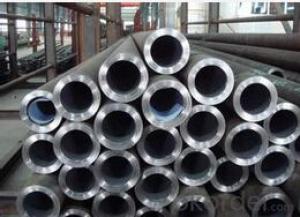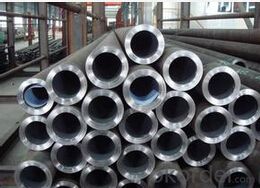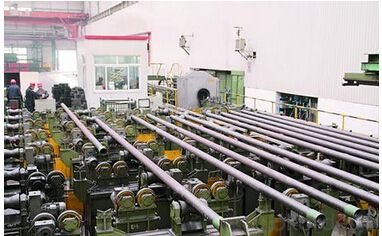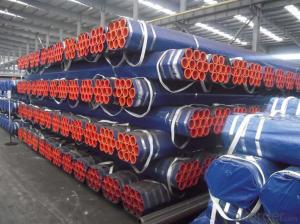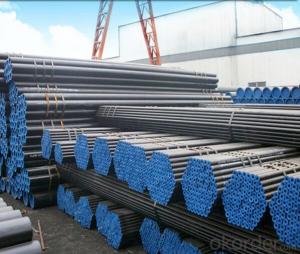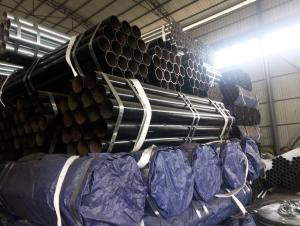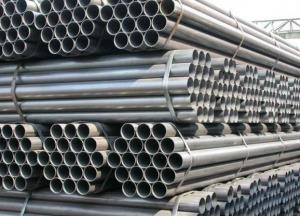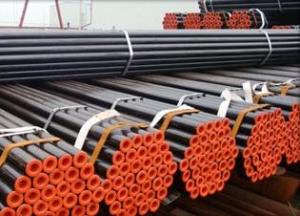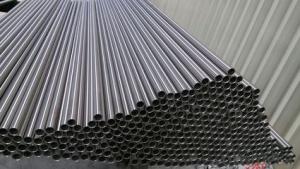boiler tube seamless carbon steel pipe for high pressure
- Loading Port:
- Tianjin
- Payment Terms:
- TT OR LC
- Min Order Qty:
- 25 m.t.
- Supply Capability:
- 60000 m.t./month
OKorder Service Pledge
OKorder Financial Service
You Might Also Like
Specifications
1. Min Order : 20 tons
2.OD: 20mm --508mm
3. WT: 3mm -- 60mm
4.Certification: ISO & API
seamless steel pipes for high pressure boiler tube
1) Standard: API Standard:ASTM A106.ASTM A53,ASTM A135,ASTM A179,ASTM A214,ASTM A192,ASTM A226,ASTM A315,ASTM A178,ASTM A210,ASTM A333,ASTM A355,ASTM A369,ASTM A334 ASTM/ASME A312/SA312, ASTM/ASME A213/SA213, ASTM A269,ASTM 511,API5L,API5CT, GOST 9940,GOST 9941,JIS G 3459, JIS GS3463, GS3467, JIS G3448, DIN EN 10216-2006(DIN 17458) , DIN EN 10297-2006(DIN 17456) etc.
2) Steel Grade: ASTM A106 GRB,A53 GRB. API 5L GRB,API 5 CT N80,K55,A335 P11.P91,DIN ST52,ST44,ST35.8,ST37,ST42,ST45
3)Outside Diameter:1/2"-20" Or 21.3-508mm
4) Wall Thickness: 3-40mm
5) Application: The products are widely used in fertilizer, petroleum, central-station, boiler, power station, shipping military, chemical industry, environment protection, traffic, metallurgy and mine, printing and dyeing, food industry, medical equipment, and so on.
Production Equipment :
30 sets of Cold-drawn Machinery (Model: 3 ton to 500 ton)
Cold-rolled Machinery: Model LD-30, LD-60, LG-90H (L), LG-159H (L)
Automatic Roller Solution & Annealing Heat Treatment Equipment
18-meter-long Pickling Sin
QUALITY ASSURANCE:
1) Strictly acc. ASTM,DIN,JIS,EN,GOST etc
2) Sample: We are accept your sample requirement
3) Test: Eddy current / hydrostatic/ Ultrasonic/ Intergranular Corrosion or according to customers' request
3) Certificate:API, CE ,ISO9001.2000.MTC etc
4) Inspection: BV,SGS,others is avaliable.
High Quality Package :
1) In bundle with strip;
2) First packing by plastic bag then strip; Details packing please see the picture in the detial description.
3) In bulk
4) Client' requirements
5) Delivery: 1) Container: 25 tons/container for pipe with usual outer diameter. For 20" container the max length is 5.8m; For 40" container the max length is 11.8m.
2) Bulk carrier: It is no requirements to the length of the pipe. But its booking space time is long.
Our Advantages:
1) Fast Delivery: around 10days below 50Metric Tons after sight of Irrevocable L/C or Deposit;(lot of high quality steel pipe in stock)
2) Quality Assured: Strictly acc. To International standard ASTM & BS & EN & JIS, with System ISO certification
3) Good Service: supplied professional technical guide free of charge at anytime;
4) Reasonable Price: to be better support your business;
- Q: Can steel pipes be used for underground oil pipelines?
- Yes, steel pipes can be used for underground oil pipelines. Steel pipes are commonly used in the construction of underground oil pipelines due to their strength, durability, and resistance to corrosion. They are able to withstand the high pressure and weight of the oil being transported, as well as any external forces such as soil movement or seismic activity. Additionally, steel pipes can be coated or lined with materials such as epoxy or polyethylene to further protect against corrosion and increase their lifespan. Overall, steel pipes are a reliable and widely used choice for underground oil pipelines.
- Q: Can steel pipes be used for gas distribution?
- Yes, steel pipes can be used for gas distribution. Steel pipes are commonly used in gas distribution systems due to their durability, strength, and resistance to corrosion. They can handle high-pressure gas transmission and are suitable for both underground and aboveground installations. However, certain safety regulations and standards must be followed to ensure the proper installation and maintenance of steel pipes for gas distribution.
- Q: How does the price of steel pipes vary based on market demand?
- The price of steel pipes can vary based on market demand. When there is high demand for steel pipes, the price tends to increase as suppliers may have limited stock and are able to charge higher prices. Conversely, when the demand is low, the price of steel pipes can decrease as suppliers may offer discounts or reduce prices to encourage sales. Therefore, market demand plays a significant role in influencing the price fluctuations of steel pipes.
- Q: What is the difference between standard wall thickness and extra-strong wall thickness steel pipes?
- Standard wall thickness steel pipes have a thickness that meets the minimum requirements set by industry standards, while extra-strong wall thickness steel pipes have a thicker wall, exceeding the minimum requirements. This difference in wall thickness makes the extra-strong pipes more robust, durable, and able to withstand higher pressure and stress compared to standard wall thickness pipes.
- Q: Can steel pipes be coated for aesthetic purposes?
- Yes, steel pipes can be coated for aesthetic purposes. Coatings such as paint, powder coating, or galvanizing can be applied to steel pipes to enhance their visual appearance and protect them from corrosion. These coatings can provide a variety of colors and finishes to suit different aesthetic requirements.
- Q: How do you protect steel pipes from fire?
- To protect steel pipes from fire, there are several measures that can be taken. One commonly used method is to apply fire-resistant coatings or paints to the surface of the pipes. These coatings or paints are designed to withstand high temperatures and provide a barrier that prevents the heat from reaching the steel. Another effective way to protect steel pipes from fire is to wrap them with fire-resistant insulation materials. These materials act as a buffer, reducing the heat transfer and slowing down the spread of fire. Insulation materials such as mineral wool or ceramic fiber blankets are commonly used for this purpose. In addition, it is important to ensure that the steel pipes are properly installed and supported. This includes maintaining proper clearance from other flammable materials and avoiding overcrowding or obstructions that could impede the flow of air around the pipes. Adequate spacing between pipes is also crucial to prevent the transfer of heat from one pipe to another. Furthermore, it is recommended to incorporate firestop systems when steel pipes pass through fire-rated walls or floors. Firestop systems consist of fire-resistant materials and seals that prevent the spread of fire and smoke through openings or penetrations in fire-rated barriers. Regular maintenance and inspections are essential to ensure the ongoing effectiveness of the fire protection measures. Any damage or deterioration of the coatings, insulation, or firestop systems should be promptly repaired or replaced to maintain the fire resistance of the steel pipes. Overall, a combination of fire-resistant coatings, insulation, proper installation, and maintenance practices are crucial in protecting steel pipes from fire hazards. These measures help to minimize the risk of fire-related damage and ensure the safety of both the pipes and the surrounding environment.
- Q: Can steel pipes be used for underground water supply networks?
- Steel pipes are a viable option for underground water supply networks; they possess qualities such as durability, strength, and corrosion resistance. These pipes are commonly employed due to their ability to endure high pressure and bear the weight of the soil and other external forces. Furthermore, steel pipes come in a range of sizes and can be easily welded, making them suitable for diverse water supply system needs. Nevertheless, it is crucial to consider factors like soil quality, the presence of corrosive substances or chemicals, and the necessity of routine maintenance to guarantee the long-lasting effectiveness of steel pipes in underground water supply networks.
- Q: How do you calculate the pipe pressure loss coefficient for steel pipes?
- To determine the pressure loss coefficient for steel pipes, one can utilize the widely accepted Darcy-Weisbach equation. This equation calculates the pressure loss in pipes caused by friction. It can be represented as follows: ΔP = f × (L/D) × (V^2/2g) In this equation: - ΔP represents the pressure loss in units of pressure, such as psi or Pa. - f denotes the Darcy friction factor, a dimensionless value. - L signifies the pipe length in units of length, such as feet or meters. - D represents the pipe diameter in units of length, such as feet or meters. - V indicates the fluid velocity flowing through the pipe in units of velocity, such as ft/s or m/s. - g represents the acceleration due to gravity in units of acceleration, such as ft/s² or m/s². The Darcy friction factor (f) is a dimensionless parameter that quantifies the amount of frictional resistance in the pipe. For steel pipes, this factor can be determined using the Moody diagram. The Moody diagram presents a graphical relationship between the Reynolds number (Re) and the friction factor (f) for various pipe roughness values. To calculate the pressure loss coefficient, one should find the friction factor (f) value based on the Reynolds number (Re) and the relative roughness of the steel pipe (ε/D). The Reynolds number is calculated as follows: Re = (ρ × V × D) / μ In this equation: - ρ represents the fluid density in units of mass per unit volume, such as lb/ft³ or kg/m³. - V denotes the fluid velocity in units of velocity, such as ft/s or m/s. - D signifies the pipe diameter in units of length, such as feet or meters. - μ represents the dynamic viscosity of the fluid in units of force per unit area per unit time, such as lb/ft·s or kg/m·s. Once the Reynolds number (Re) and the relative roughness (ε/D) are determined, one can refer to the Moody diagram to find the corresponding friction factor (f). The pressure loss coefficient (K) can then be calculated using the following formula: K = f × (L/D) In this equation: - L represents the pipe length in units of length, such as feet or meters. - D denotes the pipe diameter in units of length, such as feet or meters. By utilizing the Darcy-Weisbach equation and the Moody diagram, one can accurately calculate the pressure loss coefficient for steel pipes. This calculation is crucial for the design and analysis of fluid flow systems.
- Q: How do steel pipes handle water hammer?
- Steel pipes can effectively handle water hammer by absorbing the pressure surges caused by sudden changes in water flow. The solid and durable nature of steel helps to dampen the impact and prevent damage to the pipes or other components of the plumbing system. Additionally, steel pipes can be designed and installed with appropriate supports, expansion joints, and water hammer arrestors to further mitigate the effects of water hammer.
- Q: What are the common welding techniques used for steel pipes?
- The common welding techniques used for steel pipes include Shielded Metal Arc Welding (SMAW or stick welding), Gas Metal Arc Welding (GMAW or MIG welding), Flux-Cored Arc Welding (FCAW), and Gas Tungsten Arc Welding (GTAW or TIG welding).
Send your message to us
boiler tube seamless carbon steel pipe for high pressure
- Loading Port:
- Tianjin
- Payment Terms:
- TT OR LC
- Min Order Qty:
- 25 m.t.
- Supply Capability:
- 60000 m.t./month
OKorder Service Pledge
OKorder Financial Service
Similar products
Hot products
Hot Searches
Related keywords
